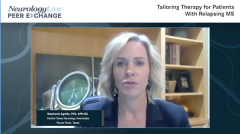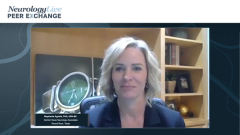
Lifestyle Interventions to Manage MS
Recommendations surrounding the use of complementary and natural therapies to manage symptoms of multiple sclerosis (MS).
Episodes in this series

Transcript:
Amy Perrin Ross, APN, MSN, CNRN, MSCN:We’re going to move into segment 3 with a brief discussion. Again, I’ll ask each of you for a 1- or 2-sentence bit of input on the concept of complementary and natural therapies for symptom control in MS [multiple sclerosis]. We’ll start off with Pat. What kind of recommendations do you make to your patients?
Patricia Melville, RN, MSN, NP-C, MSCN: This is an important topic. This comes up every day, several times a day, patients asking what they should do in terms of diet. There is no scientifically-validated diet that we can speak to our patients about taking. What I generally recommend is that they eat a healthy, well-balanced, and sensible diet, eliminate—or at least minimize—proinflammatory foods such as red meat, increase fruits and vegetables, increase whole fiber, minimize processed foods, and minimize foods high in sugar and high in salt. Hydration is critically important. Many of our patients, particularly if they have bladder problems, will limit the number of fluids that they take in.
A discussion about diet inevitably leads into a discussion about vitamin D. This is something that we also talk to our patients about. We know that vitamin D plays a role in the immune system. Talking to them about measuring their vitamin D levels, why it’s important for us to measure that, and how they might supplement with vitamin D, either through foods or through a supplement that we might even prescribe.
Amy Perrin Ross, APN, MSN, CNRN, MSCN:Great.Thanks, Pat. Stephanie?
Stephanie Agrella, PhD, APN-BC: I agree with everything Pat said. A lot of patients are looking for that MS diet and discussing the research that we do know about as far as the Mediterranean diet and the cardiovascular benefits of that diet. Then maybe touching on some of the research regarding more of an anti-inflammatory diet is another discussion that we can talk about. I also highlight vitamin D and the importance of it, not only in the immune system’s ability to function, but also in its affects that could potentially happen in the setting of MS. Highlighting the fact that this is something that they have control over, then motivating them to take that control can be helpful for them.
Amy Perrin Ross, APN, MSN, CNRN, MSCN:Christen, what are your thoughts about motivating people to get out and do things like exercise—maybe not as typical in Colorado as it is in Chicago during winter—but nonetheless, what are your thoughts?
Christen Kutz, PhD, PA-C: We have 300 days of sunshine, is what I’m told here. There’s no reason not to exercise, but I do try and emphasize the importance of exercise to our patients and remind them that this can increase their strength or balance, help prevent falls, make their spasticity better, potentially even improve bowel or bladder function, it can help with fatigue, and it can help with mood. As far as what exercise we advise, that oftentimes depends on the patient’s physical and cognitive abilities, but we have a lot of patients that enjoy yoga or tai chi, just being outside walking, swimming, biking, or hiking. I have 1 patient that likes to do Zumba videos online. Whatever they find enjoyable that helps with their overall health and well-being.
Amy Perrin Ross, APN, MSN, CNRN, MSCN:Great.Brian?
Bryan Walker, MHS, PA-C: Something is better than nothing. That’s where I tell my patients to start off with getting up and walking around their home. Even if it’s with an assisted device, or a walker, it’s going to be better than just sitting there, not doing anything. For our patients who are more mobile—you’re not training for a 5k—we’re talking about walking 20 minutes a day, most days of the week. It’s important for folks to get up and at least do something. There have been studies that have shown benefits of even doing light housework. I agree with Christen. I do believe that there are a lot of benefits for things such as yoga and tai chi to work on not only core strengthening but also balance, flexibility, and stretching. It’s incredibly important.
To tie back into diet, that’s also important. You are what you eat, and the fuel that you put in your tank is going to be important to figure out what type of energy you’re going to have. There’s a lot of input recently on the MIND diet, which is a combination of, say, the Mediterranean diet and the DASH diet, to Pat’s point earlier. These are avoiding certain things that we know are not great for us and introducing things that are more beneficial and healthier for us. Eating healthy is expensive, but there are ways to do that for every budget. These things are important. When you start to think about things, such as fatigue and cognition, these are interventions that patients can do themselves to help with both fatigue and cognition.
Amy Perrin Ross, APN, MSN, CNRN, MSCN:Thank you all so much. I would like to thank this wonderful panel, Christen Kutz, Stephanie Agrella, Bryan Walker, and Patricia Melville for this wonderful discussion. I’d like to thank you, as an audience, for watching Neurology Live® Peer Exchange. If you enjoyed the content, I suggest that you subscribe to the Neurology Live® newsletters to receive information about upcoming Peer Exchange segments and other content available to you. Thank you all so much.
Transcript edited for clarity.
Newsletter
Keep your finger on the pulse of neurology—subscribe to NeurologyLive for expert interviews, new data, and breakthrough treatment updates.

















